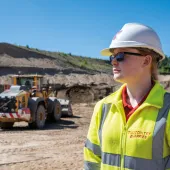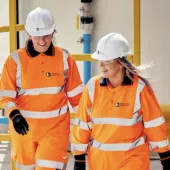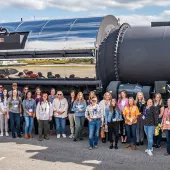Time to stop idly ticking the gender equality box

First published in the May 2018 issue of Quarry Management
The Cullimore Group, one of the most prominent and established private firms in the industry, say they have moved on from bashing the gender table and are focusing instead on creating a much more open culture of opportunity for the entire workforce, with specialist training and skills lying at the heart of this
According to managing director Moreton Cullimore, being a part of the team at The Cullimore Group means being valued for your skills, experience and potential. ‘We’re proud to adopt a team approach in all that we do and who we employ or assign tasks and responsibilities to – if necessary jettisoning traditional stereotypes and focusing instead on skills and aptitude,’ he explained. ‘With us, it’s what you put in – not who you are – that matters. If a person is committed, enthusiastic and hard-working, they’re already a good fit for our team. That means men or women, and to be honest I get tired of people talking about quotas when they should be talking about talent, skills and culture.’
For nearly a century, The Cullimore Group have been supplying the UK construction industry with materials sourced from their significant landbanks spread across Gloucestershire and Wiltshire.
Amongst the company’s 100-strong workforce are 24-year-old Emma Wallis and 18-year-old Josie Barstow, who are quarry workers at the Marston Meysey site, on the Gloucestershire–Wiltshire border. Both women operate articulated dumptrucks weighing up to 70 tonnes, and whilst this may come as a surprise to some, this is not the case at The Cullimore Group, where the skillsets of both Emma and Josie are what is most valuable.
Ensuring the workforce is equipped with the skills and knowledge necessary to be highly effective in their respective roles, rather than assigning roles based on gender and, therefore, presumed capabilities, lies at the heart of the Group’s human resource ethos.
Moreton Cullimore continued: ‘Our people want to be here and to be a part of something positive and rewarding, so it’s essential that we support and nurture them in terms of skills and training. It’s hardly news that the UK’s construction industry is experiencing a major skills shortage, and we recognize the importance of educating people about the career opportunities available to them in our line of work. Despite the many age-old ideas about who ‘fits the bill’ of being a lorry driver or a quarry worker, the real requirements are that a person is committed to training and development and passionate about what they do.’
Upon taking up employment in the Group, employees undertake specialist induction training to ensure they carry out their responsibilities with confidence. Whether it is office administration or driving a 70-tonne dumptruck, this training advances along with their progression in the company – a good incentive to encourage personal growth.
Emma Wallis began her career in the industry when she was 18, having realized that the limiting nature of a desk job was not for her. Her father, who is also an employee with Cullimore, encouraged her to pursue a career in the great outdoors by applying – and she has never looked back. Her colleague Josie started at The Cullimore Group last July, having just completed her A-levels. She was instantly made welcome by the team and is now receiving specialist training from the company, alongside a part-time college course, to ensure she is fully equipped for the long term in the construction industry.
Working in a physically demanding, potentially hazardous environment could prove daunting for many coming into the industry, but Emma and Josie prove that with a can-do attitude, it is possible to adapt to any role, whatever the challenge.
Emma Wallis commented: ‘Working at The Cullimore Group is definitely not how I’d imagined it – at first, I thought it would be really difficult to fit in. But the team was so welcoming that all my initial concerns disappeared almost immediately. In terms of the job itself, I surprised myself and realized I was capable of doing a lot more than I initially thought, not least manoeuvring a fully laden Cat ADT in sometimes tight circumstances.’
The issue requiring urgent action is that there simply are not enough skilled workers such as Emma and Josie to meet growing demands in the industry. Aggregates have a huge part to play in the house-building process, for without adequate volumes of aggregates, the voracious demands of house building and infrastructure simply will not be met. According to construction consultancy Arcadis, the UK construction industry must hire more than 400,000 men and women per year for the next five years in order to meet growing demands. Whilst Brexit could have a profound impact on the number of EU industry professionals willing to work in the UK, the issue must first be addressed through education. Schools, colleges and universities must actively encourage all students to consider a career in construction – regardless of gender, age and any other archaic conventions that are an obvious hindrance to the future of the UK’s housing market.
‘The construction industry and the aggregates sector specifically face huge pressures to meet ever-greater demands from housing and infrastructure. This calls on a motivated, skilled and fully resourced workforce,’ said Mr Cullimore. ‘Here at The Cullimore Group, we put capability before gender and stereotypical role types, so if a woman can master quarry machinery better than a male counterpart, then it produces a positive dynamic and productive workforce.’
- Subscribe to Quarry Management, the monthly journal for the mineral products industry, to read articles before they appear on Agg-Net.com








